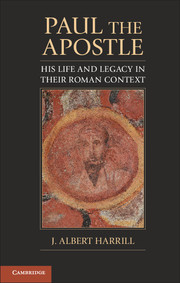Book contents
- Frontmatter
- Contents
- Figures and Boxes
- Preface
- Introduction
- PART I The Life
- PART II The Legend
- 4 Competing Stories about Paul in Late Antiquity
- 5 Paul the Scriptural Authority
- 6 How the West Got Paul Wrong
- Conclusion: Going beyond the Epitaph
- Appendix 1: Extant Writings Attributed to Saint Paul in Rough Chronological Order
- Appendix 2: Reconstructing Paul's Corinthian Correspondence: A Puzzle
- Appendix 3: Ancient Christian Works Containing Pauline Traditions and Legends
- Notes and Further Reading
- Bibliography
- Index of Biblical Citations
- Index
6 - How the West Got Paul Wrong
Published online by Cambridge University Press: 05 November 2012
- Frontmatter
- Contents
- Figures and Boxes
- Preface
- Introduction
- PART I The Life
- PART II The Legend
- 4 Competing Stories about Paul in Late Antiquity
- 5 Paul the Scriptural Authority
- 6 How the West Got Paul Wrong
- Conclusion: Going beyond the Epitaph
- Appendix 1: Extant Writings Attributed to Saint Paul in Rough Chronological Order
- Appendix 2: Reconstructing Paul's Corinthian Correspondence: A Puzzle
- Appendix 3: Ancient Christian Works Containing Pauline Traditions and Legends
- Notes and Further Reading
- Bibliography
- Index of Biblical Citations
- Index
Summary
The traditional history of Western culture celebrates Paul as the prototypical religious convert. This famous narrative holds that Paul turned his life away from his guilt-filled life as a miserable (read, “Jewish”) sinner by examining his conscience introspectively. In a proverbial dark night of the soul, Paul looked deeply into his conscience and discovered that the shortcomings and incapacities for good within his inner self arose from a general condition of evil present in all human nature. His encounter with the risen Jesus brought him the relief of forgiveness of sins and the freedom of divine grace.
I argue that Paul became this key figure most familiar today not for who he was but for who he came to be in the eyes of his later interpreters. The most important interpreter for this legacy in Western culture is Aurelius Augustine, bishop of Hippo in North Africa (354–430). Augustine developed from Paul's letter to the Romans, among other sources, a theory of Original Sin. According to Augustine, all humanity participated in the sin of Adam in the Garden of Eden (cf. Gen. 3); this sin and its punishment are transmitted to subsequent people through sexual intercourse. The invention of Original Sin in the West brought also the idea of the introspective conscience, influencing a host of modern thinkers from Friedrich Nietzsche to Sigmund Freud. To understand the origins of this Pauline master narrative in Western culture, we need to begin with a Christian prophet named Mani in Persian Mesopotamia and his sect known as the Manichaeans.
- Type
- Chapter
- Information
- Paul the ApostleHis Life and Legacy in their Roman Context, pp. 138 - 162Publisher: Cambridge University PressPrint publication year: 2012



